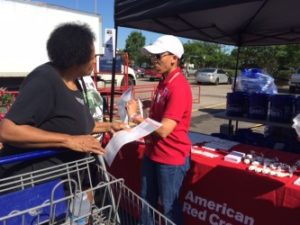Lindsay Ellard and her family had just moved back into their house after flood waters had destroyed her home in May of 2015, many of their belongings were still in boxes. Lindsay recalls that their infant daughter, who was 6 months old at the time of the May floods, saved their lives by crying as the waters rose in the night. Mother and daughter were trapped in the higher part of their house until they could be rescued.
Ten months later, flood waters returned, wiping out everything that had been rebuilt.
“I’m not sure which was better,” said Lindsay. “To wake up and find the water there, or to watch it creep up slowly, knowing there was nothing I could do to stop it.”
 Lindsay is not alone as hundreds of families affected by the earlier floods have found themselves repeating the process. Many of them came by the Red Cross bulk distribution center to pick up cleaning supplies this weekend and to swap stories of their experiences. There were those in tears over having to start over again, others angry, and some resigned.
Lindsay is not alone as hundreds of families affected by the earlier floods have found themselves repeating the process. Many of them came by the Red Cross bulk distribution center to pick up cleaning supplies this weekend and to swap stories of their experiences. There were those in tears over having to start over again, others angry, and some resigned.
What is Disaster Fatigue?
Disaster fatigue is a phenomenon that occurs when an individual, family or community is faced with a string of crises, as in the case of the neighborhoods of Houston who have had storm after storm and flood after flood. The emotional strain around having to rebuild lives is difficult enough the first time, but doing it over again compounds the stress.
The families who come to the Red Cross are dealing with the challenges in different ways. Rob Raphael shared that he and his neighbors took different paths in their recovery from the first flood. He chose to wait for the slow approval of a total rebuild of his house so that it would be “elevated” on a higher foundation. This required a longer build time made even more challenging by the waiting list for contractors in the area. His neighbors chose to refurbish their home in its original setting, betting on the flood being a one-time disaster. “They took a gamble. Now they have to decide if they want to gamble again.” Rob was quick to point out that the Red Cross helped him and his wife the first time around. “My wife was so impressed that she signed up and is now a volunteer for the Red Cross.”
Staying Postive and Getting Help After Floods
The vast majority of the people who came to get supplies had positive and determined attitudes. Helen Haywood has a full house with her daughter’s family staying with her while their home is cleaned up. “This is when you see everyone at their best,” said Helen. “People are really good about helping. The Red Cross has been there, too! Thank you, thank you!”
Lindsay Ellard had words of advice to anyone who has to face a disaster. She suggested that making a list of contact information, medical needs and anything else vital then keeping it ready is important for trying to recover. For the first flood, she didn’t ask for help, not wanting to take resources from other people who might need it more, but this time she says she’s learned that there is nothing wrong with getting help and that community support is how she’s picking up the pieces. “I’m trying to stay calm and not freak out. I never thought I’d have to worry about things like PTSD, but every time it rains I find myself starting to panic. Everyone has been so understanding.”
Tips for Coping with Disaster Events
Often people under stress feel physically and mentally drained, get frustrated more quickly and more often, but there are some things people can do to cope with events over which they have no control:
- During stressful times it’s important to eat properly and maintain a balanced diet, drink plenty of water and get some rest.
- Staying connected with friends and family is important because getting support reduces that feeling of being alone.
- Be patient with those around you and recognize that everyone is stressed and may need time to put their feelings and thoughts in order.
- Remain positive and remember having successfully gone through other tough times and reach out when support is support is needed and help others when they need it.
Bill Pennington summed up this philosophy when asked about how he was handling his second flood: “No reason to moan and groan! Just get ‘er done…one more time.”
